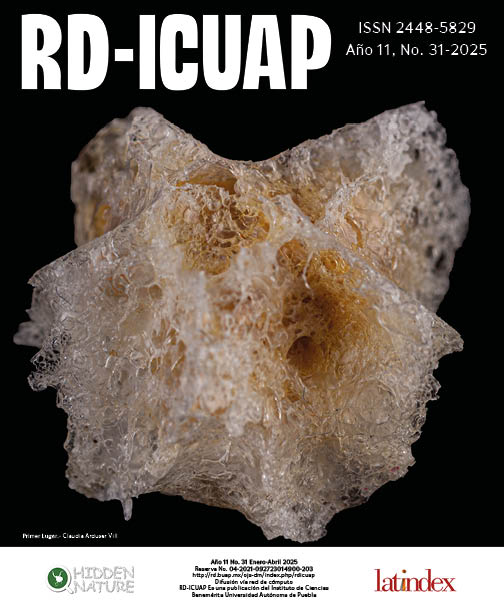EDUCACIÓN EN EL ÁREA DE INGENIERÍA Y EL AVANCE ACELERADO DE LA TECNOLOGÍA
DOI:
https://doi.org/10.32399/icuap.rdic.2448-5829.2025.31.1552Palabras clave:
Laboratorio remoto, Tecnología Educativa, Educación a Distancia, COVID-19, ConectivismoResumen
La tecnología ha experimentado un crecimiento exponencial, transformando los enfoques educativos y dando lugar a la implementación de nuevas herramientas de enseñanza. En el ámbito de las ingenierías, donde la adquisición de habilidades prácticas mediante el uso de laboratorios es fundamental, los espacios físicos se ven restringidos y limitados por diversas razones. Para resolver parte de esta problemática, surgen los laboratorios remotos basados en los entornos virtuales de aprendizaje. La pandemia causada por el virus SARS-CoV-2 aceleró la aceptación de estos entornos, optimizando el aprendizaje en línea y rediseñando las herramientas digitales, abriendo además la posibilidad de generar laboratorios remotos para superar las limitaciones de los métodos tradicionales. Sin embargo, en la perspectiva educativa es evidente la falta de adaptación al uso de herramientas diferentes a las tradicionales, siendo relevante la actualización de los modelos de enseñanza y planes educativos para una óptima implementación de laboratorios remotos que reduzcan la carencia de habilidades adquiridas regularmente en los espacios e interacciones físicas, tales como la comunicación y el trabajo en equipo. En el presente trabajo se muestra un resumen sobre lo que son los entornos virtuales y los laboratorios remotos, así como las ventajas y retos implicados.
Citas
Ahmad, S., Mohd Noor, A. S., Alwan, A. A., Gulzar, Y., Khan, W. Z., & Reegu, F. A. (2023). eLearning Acceptance and Adoption Challenges in Higher Education.
Sustainability, 15(7), Article 7. https://doi.org/10.3390/su15076190
Balamuralithara, B., & Woods, P. C. (2009). Virtual laboratories in engineering education: The simulation lab and remote lab. Computer Applications in Engineering Education, 17(1), Article 1. https://doi.org/10.1002/cae.20186
Bjelica, M., & Simić-Pejović, M. (2018). Experiences with remote laboratory. International Journal of Electrical Engineering & Education, 55(1), 79–87. https://doi.org/10.1177/0020720917750960
Cohen, E., & Nycz, M. (2006). Learning Objects and E-Learning: An Informing Science Perspective. Interdisciplinary Journal of E-Learning and Learning Objects, 2(1), 23–34.
Cooper, M. (2005). Remote laboratories in teaching and learning – issues impinging on widespread adoption in science and engineering education. International Journal of Online and Biomedical Engineering (iJOE), 1(1), Article 1. https://doi.org/10.3991/ijoe.v1i1.298
Fabregas, E., Farias, G., Dormido-Canto, S., Dormido, S., & Esquembre, F. (2011). Developing a remote laboratory for engineering education. Computers & Education, 57(2), Article 2. https://doi.org/10.1016/j.compedu.2011.02.015
Ferreira, P., Fidalgo, A., & Gericota, M. G. (2019). Pedagogical theories for e-learning engineering degrees based on remote laboratories: The e-lives approach.
EDULEARN19 Proceedings 11th International Conference on Education and New Learning Technologies: Palma, Spain. 1-3 July, 2019, 2019, ISBN 978-84-09-12031-4, Págs. 3451-3456, 3451–3456. https://dialnet.unirioja.es/servlet/articulo?codigo=7461839
Haque, E., Ahmed, F., Das, S., & Salim, K. M. (2015). Implementation of remote laboratory for engineering education in the field of Power electronics and Telecommunications. 2015 International Conference on Advances in Electrical Engineering (ICAEE), 213–216. https://doi.org/10.1109/ICAEE.2015.7506834
Hernandez, R. M. (2017). Impact of ICT on Education: Challenges and Perspectives. Journal of Educational Psychology - Propositos y Representaciones, 5(1), 337–347.
INEGI. (2021). Encuesta para la Medición del Impacto COVID-19 en la Educación
(ECOVID-ED) 2020. https://www.inegi.org.mx/investigacion/ecovided/2020/
Muttappallymyalil, J., Mendis, S., John, L. J., Shanthakumari, N., Sreedharan, J., &
Shaikh, R. B. (2016). Evolution of technology in teaching: Blackboard and beyond in Medical Education. Nepal Journal of Epidemiology, 6(3), 588–594. https://doi.org/10.3126/nje.v6i3.15870
Pastor, R., Tobarra, L., Robles-Gómez, A., Cano, J., Hammad, B., Al-Zoubi, A.,
Hernández, R., & Castro, M. (2020). Renewable energy remote online laboratories in Jordan universities: Tools for training students in Jordan. Renewable Energy, 149, 749–759. https://doi.org/10.1016/j.renene.2019.12.100
Roda-Segarra, J. (2021). Virtual Laboratories During the COVID-19 Pandemic: A Systematic Review. 2021 XI International Conference on Virtual Campus (JICV), 1–4. https://doi.org/10.1109/JICV53222.2021.9600344
Santamaría-Sandoval, J. R., Chanto-Sánchez, E., & Soto-Calderón, M. (2022). Aplicación de laboratorios virtuales en la carrera de Ingeniería en Telecomunicaciones,
UNED. Revista Electrónica Calidad en la Educación Superior, 13(2), Article 2. https://doi.org/10.22458/caes.v13i2.4487
Siemens, G. (2005). Connectivism: A Learning Theory for the Digital Age. International Journal of Instructional Technology and Distance Learning, 2. http://www.itdl.org/Journal/Jan_05/article01.htm
Soria, M., Fernandez, R., Gómez, M., Paz, H., Pozzo, M., DOBBOLETTA, E., Fidalgo, A., Alves, G., Sancristobal, E., Loro, F., Castro, M., & Diaz, G. (2017, septiembre 15). Perspectivas de los Laboratorios Remotos en la Educación Media y Superior de Santiago del Estero.
Stroeva, O. A., Zviagintceva, Y., Tokmakova, E., Petrukhina, E., & Polyakova, O. (2019). Application of remote technologies in education. International Journal of Educational Management, 33(3), 503–510. https://doi.org/10.1108/IJEM-08-2018-0251
Thorsteinsson, S. E., Geirsdottir, G., Andersen, K., Thorbergsson, H., & Gudmundsson, K. S. (2018). Trial with a Remote Laboratory in Telecommunications Engineering. 2018 IEEE International Professional Communication Conference (ProComm), 74–79. https://doi.org/10.1109/ProComm.2018.00026
Van den Beemt, A., Groothuijsen, S., Ozkan, L., & Hendrix, W. (2023). Remote labs in higher engineering education: Engaging students with active learning pedagogy. Journal of Computing in Higher Education, 35(2), 320–340. https://doi.org/10.1007/s12528-022-09331-4
Descargas
Publicado
Cómo citar
Número
Sección
Licencia
Derechos de autor 2025 RD-ICUAP

Esta obra está bajo una licencia internacional Creative Commons Atribución-NoComercial-SinDerivadas 4.0.
Definir aviso de derechos.
Los datos de este artículo, así como los detalles técnicos para la realización del experimento, se pueden compartir a solicitud directa con el autor de correspondencia.
Los datos personales facilitados por los autores a RD-ICUAP se usarán exclusivamente para los fines declarados por la misma, no estando disponibles para ningún otro propósito ni proporcionados a terceros.


